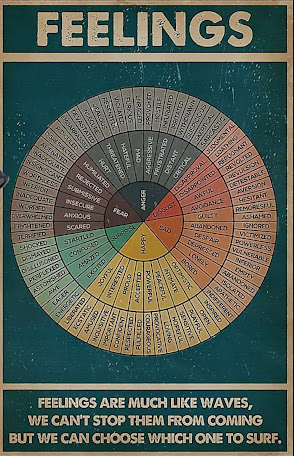It can sometimes be challenging to voice your position in such a way that it is heard. This is an essential part of a performers craft. But it is also useful in everyday life. Especially today, in a world where opinions are more and more polarized, learning to effectively navigate strong emotions makes all the difference in cutting through the noise and being heard. Instead of feeling like we are on a battlefield, it is useful to view the issue as a misunderstanding, and turn it into an opportunity to communicate clearly.
Here are 3 essential steps to turn misunderstanding into opportunities to gain clarity whether on stage or on the street:
1 - Notice your emotions.
How do you feel when you are being contradicted or misunderstood? It may feel frustrating if you had hoped the story or conversation would go one way, and it goes another. You may feel irritated that you have to navigate an unexpected detour or interruption to your flow. It may also anger you if you feel unseen and unheard.
How do you feel when you are being contradicted or misunderstood? It may feel frustrating if you had hoped the story or conversation would go one way, and it goes another. You may feel irritated that you have to navigate an unexpected detour or interruption to your flow. It may also anger you if you feel unseen and unheard.
2 - Accept your feelings.
What would it take for you to accept yourself, and how you feel? Our voices will close down if we don't fully accept what we feel, and this may be especially the case with the uncomfortable emotions like frustration, irritation and anger.
What would it take for you to accept yourself, and how you feel? Our voices will close down if we don't fully accept what we feel, and this may be especially the case with the uncomfortable emotions like frustration, irritation and anger.
3 - Listen and Harness the energy of your emotions.
Why do you think we have strong feelings? Your body is talking to you. Emotions are feelings - sensations running through you. Once you accept your them - sensations/feelings/emotions- they have the potential to energize you, move you. Anger in particular can help you gain clarity about your position, and enable you to articulated it.
Anger, as my teacher Enrique Pardo taught me years ago, is the best teacher of articulation. Not only does anger help clarify your thoughts, anchor your voice, and pronounce each syl-la-ble — it will enable you to focus your speech, and articulate your thoughts so powerfully, that they are heard.
... you may even surprise yourself by what you say!
This happened to me just last weekend. I was brainstorming with colleagues about my work and had asked for advice about how to best use my blog for writing and publishing —this is what we were all focusing on that day. One of my colleagues shifted the conversation suggesting I still needed clarity on a completely different issue – one that I felt I had already resolved. I was irritated because I didn't want to waste precious time, but he continued making his point. So I became frustrated with his insistence on staying off theme. Then, when he made a possibly well-meaning suggestion encouraging me to consider that I could aim (higher) to teach people to be the best actor or singer in the field — I became angry.
I was present to my senses (step 1), accepted my feelings (step 2), and my anger became a resource (step 3), in this case, to gather strength — to 'dig in' and position myself.
It empowered me to voice and to clearly state something I had yet to articulate: that making someone 'the best' is not at all my ambition. Instead, what I really want is to help highly trained and experienced performing artists remember why they decided to perform in the first place. Once I said this, everyone felt it land, and the conversation smoothly turned in the direction I had hoped. But it was this moment that I kept thinking back to the next day, and the next... and now I'm writing about it!
When I said my peace, this colleagues gave me a lovely response, saying “well maybe I have something to learn from you then.” And though we didn't really get deeper with my original questions, this exchange was gold. So, thank you dear friend, for misunderstanding me. Without that, I may never have 'landed the plane,' and gained such clarity, and received such affirmation. Because even though these thoughts were always in my heart, they needed to be spoken, so that I, myself, would fully hear them.
